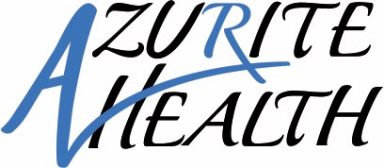July 2025
International Group B Strep Awareness Month

Protecting Newborns Through Awareness, Screening & Equity
Each July, International Group B Strep (GBS) Awareness Month brings global attention to the risks of GBS infection in newborns—a preventable yet serious condition.
Group B Streptococcus is a common bacterium that many people carry without symptoms. But when passed to a baby during labour, it can cause life-threatening infections such as sepsis, pneumonia, or meningitis.
At Azurite Health, we believe every baby deserves a safe start in life. This month, we’re raising awareness of GBS and the steps that can protect both mothers and babies—especially in communities where access to care and screening may be limited.
Why this matters:
- Awareness saves lives: Many parents and even healthcare providers are unaware of the risks of GBS, especially in settings without routine screening protocols.
- Early screening is key: Maternal GBS testing during pregnancy can lead to timely antibiotic treatment in labour, dramatically reducing the risk to the baby.
- Equity matters: Black women and families in low-resource settings face a greater burden of maternal and newborn complications. Addressing GBS is one important step toward more equitable maternal health outcomes.
We’re committed to amplifying knowledge, promoting prevention, and closing awareness gaps—because health equity begins at birth.
💬 Follow us on LinkedIn: Azurite Health | LinkedIn for more updates throughout the month.
Learn more: Group B Strep Awareness - Group B Strep International



June Health Awareness – Men’s Health

June marks an important opportunity to reflect on the health and wellbeing of men across the UK and beyond. With Men’s Health Week (9–15 June 2025) and Father’s Day on the 15th, we’re taking time this month to shine a spotlight on the physical and emotional challenges many men face—often in silence.
At AMP² Innovation by Azurite Health, we’re using June to open up honest conversations, break stigma, and share resources that can make a real difference.
🔍 Why it matters
Men are less likely to access health and mental health services—often due to stigma, cultural barriers, or a lack of targeted support. Referral data highlights a notably low number of men engaging with mental health support services, especially from Black African and Caribbean communities. By raising awareness this June, we hope to bridge that gap and encourage more men to access the care they deserve.
💬 What we’re doing
On Monday 9 June, we’re hosting a 30-minute online session:
Beyond the Gym: Supporting Men’s Mental and Physical Health
This informal, interview-style discussion features insights from our Community Outreach Manager, James Hanlon, and will explore:
Real talk on stress, identity, and silent struggles
How to access free health checks and mental health support
Small steps every man can take this week
Signposting to trusted services like Samaritans (national) and Time to Talk (Greenwich, UK only)
📍 Where: Online via Microsoft Teams Beyond the Gym: Supporting Men’s Mental and Physical Health
🕐 When: Monday, 9 June 2025, 18:00–18:30 (BST)
Join us in supporting men’s health this month—and beyond.


May: Health Awareness
Action on Stroke Month: Spot the Signs, Save a Life

May is Action on Stroke Month in the UK—a time to raise awareness about one of the leading causes of death and long-term disability. While stroke affects people across all walks of life, research shows that individuals from African, Caribbean, and South Asian backgrounds are more likely to experience strokes at younger ages and face worse outcomes, often due to delayed diagnosis, unequal access to care, and gaps in post-stroke support.
🧠 What Is a Stroke?
A stroke happens when the blood supply to part of the brain is cut off, leading to brain cell damage or death. There are two main types:
- Ischaemic stroke – caused by a blockage (most common)
- Haemorrhagic stroke – caused by bleeding in or around the brain
⚠️ Recognise the Signs – Act FAST
Quick recognition can save lives and reduce long-term damage. The FAST test is a simple way to identify symptoms:
- F – Face: has it fallen on one side?
- A – Arms: can they raise both arms?
- S – Speech: is it slurred or confused?
- T – Time: call 999 immediately
Even one of these signs is reason to act. Stroke is a medical emergency, and every minute counts.
🌍 Inequities in Stroke Care
According to the Stroke Association and Public Health England, people of African, Caribbean, and South Asian heritage not only face a higher risk of stroke, but also systemic barriers that can lead to delayed diagnosis and treatment. Risk factors like hypertension, diabetes, and sickle cell disease are often underdiagnosed or poorly managed in these populations.
At Azurite Health, we advocate for:
- Culturally appropriate stroke education
- Earlier screening and better risk factor management
- More inclusive clinical research
- Equitable access to post-stroke rehabilitation

🔄 Working Toward Equity
Stroke doesn’t discriminate—but health systems often do. By addressing these gaps in awareness, access, and treatment, we can help ensure that more people receive the care they need—when they need it most.
This Action on Stroke Month, we’re calling for better education, earlier action, and a stronger commitment to equity in stroke prevention and recovery.
📩 Interested in collaborating with us on outreach or clinical initiatives? Email info@azurite-health.co.uk
📚 References:
- Stroke Association. (2025). Ethnicity and Stroke.
https://www.stroke.org.uk/what-is-stroke/are-you-at-risk/ethnicity-and-stroke - NHS. (2025). Stroke – Symptoms and FAST Test.
https://www.nhs.uk/conditions/stroke/ - Public Health England. (2024). Health Inequalities and Stroke Risk.
https://www.gov.uk/government/publications/stroke-prevention-pack
April: Testicular Cancer Awareness Month

Breaking the Silence on Men’s Health
Signs and Symptoms to Watch For
Testicular cancer may be one of the less common forms of cancer, but for young men aged 15 to 49, it is the most frequently diagnosed cancer in the UK. Despite its high survival rate when caught early, a lack of awareness and ongoing stigma around men's health continues to delay diagnosis and treatment.
Signs and Symptoms to Watch For
Early detection is vital. Key symptoms include:
A lump or swelling in the testicle (usually painless)
A heavy feeling in the scrotum
Discomfort or pain in a testicle or the scrotum
A sudden collection of fluid in the scrotum
Many men delay seeking help out of embarrassment or fear. Raising awareness can help overcome these barriers.
Understanding Testicular Cancer
Equity, Access, and Awareness
Testicular cancer begins in the testicles (testes), part of the male reproductive system. Most cases are either seminomas or non-seminomas, and early-stage cancers are highly treatable. According to Cancer Research UK, around 2,400 men are diagnosed each year in the UK, with a survival rate of more than 95% if caught early.
At Azurite Health, we understand that health outcomes improve when communities are informed and engaged. Men from marginalised backgrounds—particularly Black, Asian, and other minority ethnic communities—may face additional barriers to accessing timely healthcare. Culturally sensitive outreach and awareness campaigns are essential to ensure early detection isn’t a privilege, but a standard.
We also believe education must start early, especially for young people who often receive little information about testicular health in school or public health messaging.
Moving the Conversation Forward
Moving the Conversation Forward
Throughout April, Testicular Cancer Awareness Month gives us the opportunity to break down stigma and promote open dialogue. Whether through clinical education, culturally inclusive materials, or digital health tools, we all have a role to play.
Let’s keep the conversation going—because talking about it could save a life.
References:
Cancer Research UK (2024). Testicular Cancer Statistics. Retrieved from https://www.cancerresearchuk.org/health-professional/cancer-statistics/statistics-by-cancer-type/testicular-cancer
NHS UK (2024). Testicular Cancer – Overview. Retrieved from https://www.nhs.uk/conditions/testicular-cancer/
Orchid (2024). Fighting Male Cancer. Retrieved from https://www.orchid-cancer.org.uk/testicular-cancer/
📩 For collaboration or outreach opportunities, contact us at info@azurite-health.co.uk


🌍 March: Brain Tumour Awareness Month 🌍
🔬 The Challenge of Brain Tumours
March marks Brain Tumor Awareness Month in the UK, a time dedicated to raising awareness about one of the most complex and least understood cancers. Despite medical advancements, brain tumors remain a leading cause of cancer-related deaths in children and adults under 40, with survival rates lagging behind other forms of cancer (Macmillan Cancer Support, 2025).
A brain tumour is a mass of abnormal cells growing in the brain. They can be benign (non-cancerous) or malignant (cancerous), but both types can significantly impact brain function due to their location.
Key statistics:
📌 Over 12,000 people in the UK are diagnosed with a primary brain tumour each year.
📌 Brain tumours are responsible for more years of life lost than any other cancer due to their high impact on young people (Macmillan Cancer Support, 2025).
📌 Survival rates have barely improved in over 40 years, emphasising the need for further research and innovation.
🧠 Early Detection & Diagnosis: The Key to Better Outcomes
Early detection can make a critical difference in treatment success. However, symptoms of brain tumours can be vague and often resemble other conditions, leading to late diagnoses.
🚨 Common symptoms include:
- Persistent headaches that worsen over time
- Unexplained nausea or vomiting
- Seizures or vision problems
- Memory or cognitive difficulties
🔍 According to NHS Shropshire, Telford & Wrekin, understanding the symptoms and seeking medical advice early can improve diagnostic outcomes (NHS Shropshire, Telford & Wrekin, 2025).
Building a Healthier Future Together
Brain tumour treatment remains one of the most underfunded areas of cancer research. However, recent breakthroughs in AI, precision medicine, and immunotherapy are providing hope.
Promising innovations include:
✅ AI-driven diagnostics: Advanced machine learning models are improving tumour detection in MRI scans.
✅ Targeted therapies: Precision medicine allows for tailored treatments based on genetic tumour profiles.
✅ Immunotherapy: Researchers are exploring new ways to boost the immune system’s response to brain tumours.
🚀 Collaboration between biotech firms, research institutions, and clinical trial networks is crucial in accelerating these innovations.
🤝 How We Can Make a Difference
At Azurite Health, we are committed to supporting advancements in clinical research, technology-driven healthcare solutions, and equitable access to treatments. Brain tumour research needs more funding, collaboration, and patient-centred innovation to create real change.
🔹 Support brain tumour research initiatives
🔹 Advocate for more funding in neuroscience and oncology
🔹 Raise awareness about early detection
Let’s work together this March to raise awareness, spread knowledge, and empower everyone to prioritize their health. Together, we can make a difference. 🌟
If you have any questions or learning more about inclusive clinical research, please contact us at info@azurite-health.co.uk📜✅
References:
Macmillan Cancer Support. (2025). Brain Tumour Awareness Month: Raising Awareness & Supporting Patients: https://www.macmillan.org.uk/cancer-awareness/brain-tumour-awareness-month
NHS Shropshire, Telford & Wrekin. (2025). Brain Tumour Awareness Month: Do You Know the Signs and Symptoms?: https://www.shropshiretelfordandwrekin.nhs.uk/brain-tumour-awareness-month-do-you-know-the-signs-and-symptoms/

